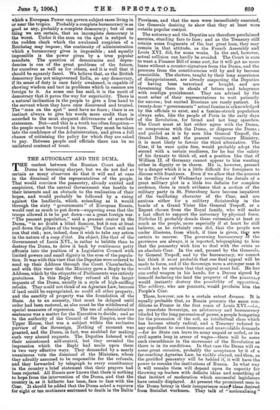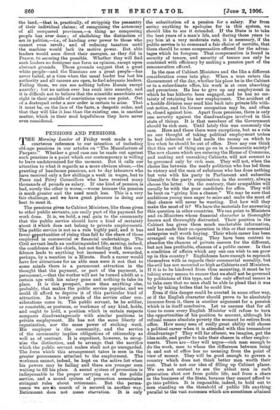THE AUTOCRACY AND THE DUMA. T HE contest between the Russian
Court and the Duma is becoming sharper, but we do not feel so certain as many observers do that it will end at once in the dismissal of the representatives of the people. That would convince the peasantry, already excited and suspicious, that the central Government was hostile to their interests and an obstacle to the realisation of their hopes, and would. probably be followed by a rising against the landlords, which, extending as it would. through the sixty " governments " of European Russia, would cost as much to put down—supposing even that the troops allowed it to be put down—as a great foreign war. " The peasant population," said a peasant orator in the Duma, "is no doubt a blind Samson, but it can at least pull down the pillars of the temple." The Court will not run that risk ; nor, indeed, does it wish to take any action in the nature of a coup d'aott. Its object, like that of the Government of Louis XVI., is rather to belittle than to destroy the Duma, to drive it back by continuous petty affronts into the position of a Legislative Council with limited powers and small dignity in the eyes of the popula- tion. It was with this view that the Deputies were ordered to send up their Address through the Court Chamberlain, and with this view that the Ministry gave a Reply to the Address, which by the etiquette of Parliaments was entirely gratuitous. In this Reply they refused all the larger requests of the Duma, usually in a style of high-sniffing rebuke. They could not think of an Agrarian Law, because if land could be expropriated, so could all other property, and the sanctity of property was the foundation of the State. As to an amnesty, that must be delayed until order had been restored, as also must be the withdrawal of special measures of repression. The use of administrative sentences was a matter for the Executive to decide; and as to the authority of the Council of the Empire, now the Upper House, that was a subject within the exclusive purview of the Sovereign, Nothing of moment was granted, and the Duma, in fact, was snubbed for making such very absurd requests. The Deputies listened with their accustomed self-control, but they revealed the impression which the Reply had made upon them in two very effective ways. They demanded by a nearly unanimous vote the dismissal of the Ministers, whom they adroitly assumed to be responsible for the refusals, and they forwarded by telegraph to every constituency in the country a brief statement that their prayers had been rejected. All Russia now knows that there is nothing to hope from the intervention of the Duma, and that the country is, as it hitherto has been, face to face with the Czar. It should be added that the Duma asked a reprieve for eight or ten mutineers sentenced to death in the Baltic Provinces, and that the men were immediately executed, the Generals desiring to show that they at least were outside popular control.
The autocracy and the Deputies are therefore proclaimed enemies, standing face to face ; and as the Treasury still retains some fragments of the last great loan, they may remain in that attitude, as the French Assembly and Louis XVI. did, for some weeks. In the end, however, actual collision can hardly be avoided. The Court is sure to want a Finance Bill of some sort, for it will get no more loans without a counter-signature from the Duma, and the pressure from the constituencies will by and by become irresistible. The electors, taught by their long experience of disappointment, are already suspecting the Deputies of having been terrorised or bought, and are threatening them in shoals of letters and telegrams with condign punishment. They are advised by the most sober of their representatives to wait patiently for success ; but excited Russians are rarely patient. In twenty-four " governments " actual famine is acknowledged by the officials to exist, and a famine-struck population always asks, like the people of Paris in the early days of the Revolution, for bread and not long speeches.' The Court must at last either agree with the Duma, or compromise with the Duma, or disperse the Duma ; and guided as it is by men like General Trepoff, the Grand. Dukes, and the present reactionary Ministry, it is most likely to favour the third. alternative. The Czar, if he were quite free, would probably adopt the second with a certain readiness, for he has the safety of his dynasty to think of, and a position like that of William II. of Germany cannot appear to him wanting either in dignity or in charm. He is, however, pressed. by a danger which it is a little difficult for foreigners to discuss with frankness. Even if we allow that the account in the Tribune of Wednesday revealing the details of a great military plot is a little too definite for complete credence, there is much evidence that a section of the military party in St. Petersburg have become impatient of the vacillating character of the Czar, and are anxious either for a military dictatorship in the hands of a Grand Vizier like General Trepoff, or a Regent chosen from the Royal family, who will make a last effort to support the autocracy by physical force. Nicholas II. probably dreads these extremists at least as much as the people, more especially if at heart he still believes, as he certainly once did, that the people are under illusions, from which, if time is given, thly are certain to recover. The governing bureaucracy of the provinces are always, it is reported, telegraphing to him. that the peasantry wish him to deal with the crisis as an absolute Czar. In the end, pressed by the Generals, by General Trepoff, and by the bureaucracy, we cannot but think it most probable that one final appeal will be made to force, and if the Sovereign were a stronger man it would. not be certain that that appeal must fail. He has one awful weapon in his hands, for a Decree signed by himself declaring the land the property of the peasn.ntly would instantly destroy the possibility of opposition. The soldiery, who are peasants, would proclaim him the People's Czar.
These, however, are to a certain extent dreams. It is equally probable that, as Russia presents the same con- ditions as France in the first years of Louis XVI.—i.e., an irresolute Sovereign, an aristocracy and bureaucracy blinded by the long possession of power, a people hungering for the possession of the soil, an intellectual class which has become utterly radical, and a Treasury reduced to any expedient to meet immense and unavoidable demands —for no State can leave its army unpaid or unfed, or its civil agents long in arrear of wages—there will be some such resemblance in the movement of the Revolution as there is in its conditions. In that case the Duma will on some great occasion, probably the acceptance by it of a far-reaching Agrarian Law, be visibly obeyed, and then, as the gratified peasantry will be behind it, it will have the power to remake the institutions of Russia. In what way it will remake them will depend upon its capacity for throwing up leaders with definite ideas and something of that instinct of moderation which successful legislators have usually displayed. At present the prominent men in the Duma betray in their inexperience man? ideas derived from Socialist workmen. They talk of " nationalising " the land,—that is, practically, of strippirig the peasantry of their individual claims ; of recognising the autonomy of all conquered provinces,—a thing no conquering people has ever done ; of abolishing the distinction of sex in politics,—i.e., of handing over power to those who cannot even revolt; and of reducing taxation until the machine would lack its motive power. But able leaders would soon direct their energies, as they did in France, to securing the possible. Whether they will find such leaders no foreigner can form an opinion, except upon abstract grounds. Those grounds suggest that a great white people—and the Russians are a great people—has never failed, at a time when the usual leader has lost his authority and all careers are open, to find adequate leaders. Failing them, we can see nothing before Russia except anarchy • but no nation ever has sunk into anarchy, and it is difficult not to believe that the scientific anarchists are right in their muddle of convictions upon one point. Out of a destroyed order a new order is certain to arise. That it must be, on the face of the facts, a despotic order, and that they will like it less than the existing one, is another matter, which in their mad hopefulness they have never even considered.







































 Previous page
Previous page